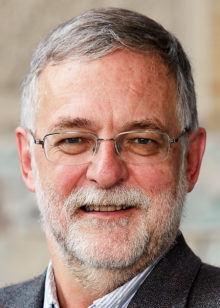When it comes to tackling issues of sustainability and waste reduction, Professor John Robinson believes that normalizing sustainability in our everyday lives will have a far greater impact than trying to enact individual behavioural change. Prof. Robinson is a Professor at the Munk School of Global Affairs and Public Policy, and the School of the Environment, at the University of Toronto, and is the challenge expert for the 2018/2019 GII Program focusing on Plastic Waste Reduction. As a leading expert in the field of sustainability, much of his current work focuses on a global trend towards the normalization of sustainability, which he believes lies in institutional change and community engagement. The normalization of sustainability is a social approach that encourages the unconscious practice of sustainable processes in our day-to-day lives, without having to force behavioural change.
According to Prof. Robinson, “part of the approach of normalizing is to think at the collective level. One way is to pay attention to the institutional rules that govern how people behave in the institution, and how the institutions behave. The rules and codes of conduct within an institution are what determine what people do in that institution.” An example of this is normalizing sustainable behaviour through a building’s design. Research has shown that if a building is designed with sustainability in mind, the users of that building will be more likely to subconsciously act in accordance with the sustainable atmosphere of that building. This is a perfect example of normalization vs. individual change being an effective method towards greater sustainability.
Additionally, the process towards normalization must occur through community engagement. “Community engagement allows us to understand the larger narrative of who we are, what the city is, and we want the city to be. This involves getting a sense of how issues of waste reduction are perceived at the collective level, through an understanding of the different cultural norms that are implicit within different groups.” This is especially important within such a diverse city like Toronto, where different communities have different norms and different levels of awareness when it comes to sustainable practices. As a result, Prof. Robinson suggests that through community engagement, we can begin to untangle some of the influences on behaviour within different communities which will aid in determining what changes can be made at the institutional level to begin normalizing sustainable behaviour on a larger scale.
This broader understanding of the influences that lead to increased waste will be necessary for the students participating in the GII program this year, as they begin to develop their own solutions for plastic waste reduction. Prof. Robinson suggests that students should try to have a greater understanding of big picture waste problem, but then to narrow in on a specific part of that problem in order to focus their ideas and create an effective solution. “It is good to have the big picture, but then you have to pick your piece, you can’t solve the whole system. Finding a piece of the system where you can propose something concrete is a big part of the challenge. You have to go wide to understand the problem and then converge on a very specific thing. It will be a big challenge for them (the students), but young people are incredibly innovative, so maybe it is best to just leave it up to their creative juices.”
